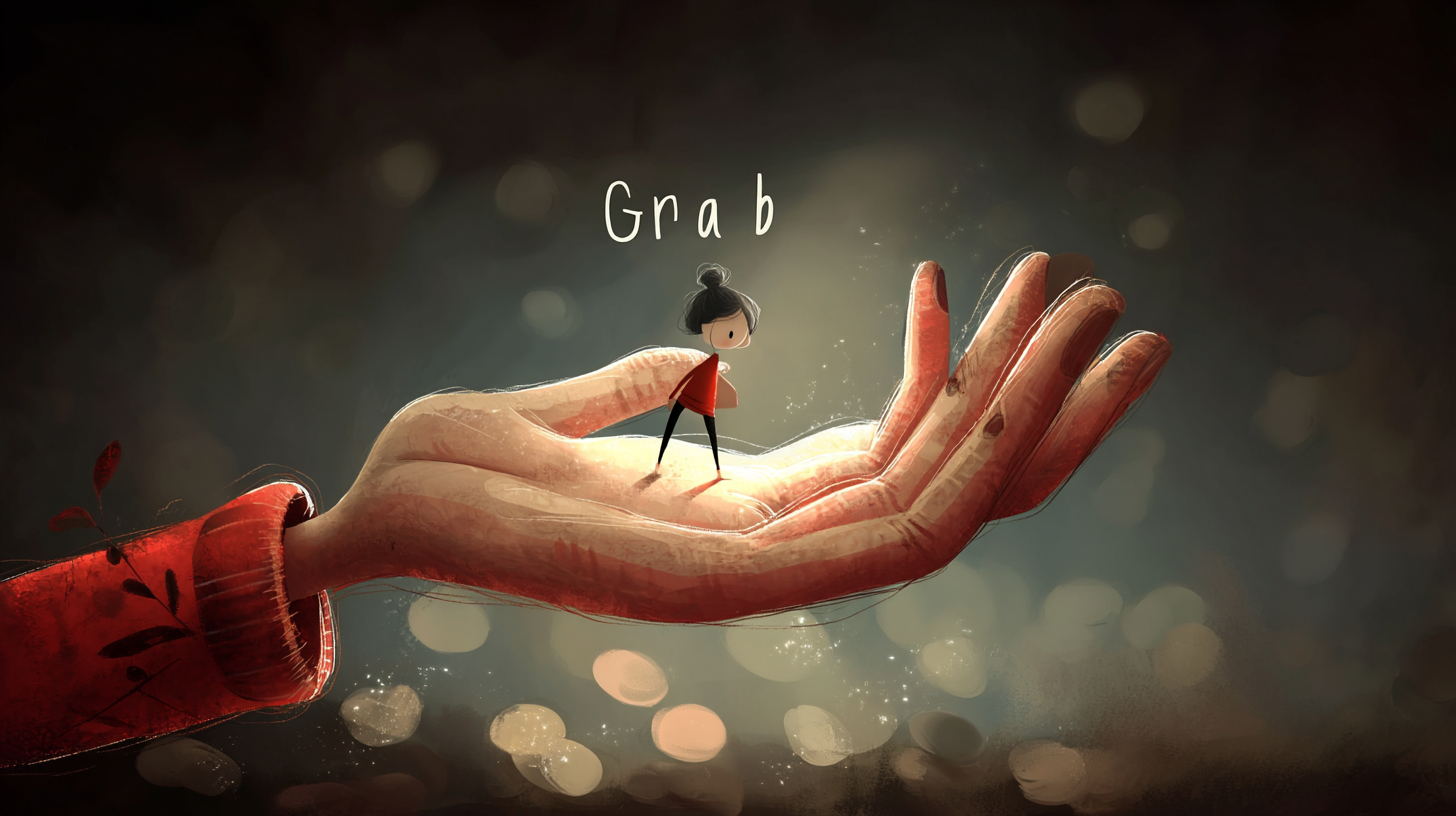“Grab” means to take something quickly with your hand.
grabは、何かをすばやく手でつかむことを意味します。
以下は英単語 “grab” に関するストーリー型学習コンテンツです。まずは大枠の意味を理解して最後の文章で確認しましょう。
主な意味(main meaning)
| 品詞 | 意味 | 発音記号 | 英語例文 |
|---|---|---|---|
| 動詞 | すばやくつかむ、急いで手に入れる | /ɡræb/ | He grabbed my arm to stop me from falling. |
| 名詞 | つかむこと、急いで取ること | /ɡræb/ | She made a quick grab for the last cookie. |
語源(etymology)
「grab」は古ノルド語の「grapa(つかむ)」に由来します。基本イメージは「すばやくしっかりつかむ」。
類義語(synonyms)
| 類義語 | 英語例文 |
|---|---|
| seize | The police seized the stolen goods. |
| snatch | She snatched the letter from his hand. |
| clutch | He clutched the steering wheel tightly. |
| grasp | I grasped the rope to stop myself from falling. |
| take | He took the book from the shelf. |
反義語(antonyms)
| 反義語 | 英語例文 |
|---|---|
| release | He released her hand gently. |
| drop | She dropped the glass by accident. |
コロケーション(collocations)
| コロケーション | 英語例文 |
|---|---|
| grab a bite | Let’s grab a bite before the meeting. |
| grab a seat | I grabbed a seat near the window. |
| grab an opportunity | She grabbed the opportunity to study abroad. |
| grab attention | The ad quickly grabbed my attention. |
| grab a drink | We grabbed a drink after work. |
2項表現(binomials)
| 2項表現 | 英語例文 |
|---|---|
| grab and go | This is a great grab-and-go breakfast. |
| push and grab | He tried to push and grab the bag at once. |
英語ストーリー(english story)
Title: A Busy Day at the Café
Tom works at a small café in the city. One morning, as he was opening the store, a woman rushed in to grab a coffee. “Sorry,” she said, “I’m in a hurry!”
Tom smiled and prepared a grab-and-go cup for her. She paid quickly and left. A few minutes later, a man came in and tried to grab a seat by the window. But an old lady had just snatched it before him.
Later that day, Tom saw a little boy clutching his toy car tightly. The boy dropped it, and Tom quickly grabbed it and gave it back to him.
At lunch, Tom had no time to eat, so he grabbed a bite between serving customers. He always tried to grab every opportunity to rest. Suddenly, there was a loud noise outside. A man had dropped his phone on the sidewalk. He bent down to grab it, but someone else seized it and ran off. Tom called the police.
The police came and took the man’s report. Luckily, a bystander had seen everything and helped them catch the thief.
It was a long, busy day, but Tom felt happy. “Sometimes life is just about catching moments,” he thought. “You grab them, or they’re gone.”
和訳
タイトル:カフェでの忙しい一日
トムは街の小さなカフェで働いています。ある朝、店を開けようとしていると、女性が急いで**grab(つかむ)**に来ました。「すみません、急いでいるんです!」
トムは笑顔で彼女のために**grab-and-go(持ち帰り用)のコーヒーを準備しました。彼女はすぐに支払いをして出て行きました。数分後、男性が入ってきて窓際の席をgrab(つかもう)としましたが、老婦人がsnatch(素早く奪う)**しました。
その日の午後、トムは小さな男の子が**clutch(しっかり握る)していたおもちゃの車を見ました。男の子が落としたので、トムはすぐにgrab(拾って渡す)**しました。
昼食の時間、トムには食べる時間がなく、接客の合間に**grab a bite(軽く食べる)をしました。トムはいつもgrab an opportunity(チャンスをつかむ)**ようにして休みを取ろうとします。
突然、外で大きな音がしました。男性が歩道に携帯を落としました。拾おうとしてかがんだところ、別の誰かがそれを**seize(奪い取る)**して走り去りました。トムは警察に電話しました。
警察が来て、男性の話を**take(聞き取り)**ました。幸い、通行人がすべてを見ており、犯人逮捕に協力しました。
長く忙しい一日でしたが、トムは満足していました。「人生って、瞬間をつかむことなんだな」と思いました。「grabしないと、すぐに過ぎ去ってしまう。」
Q&A
Q: 「grab」と「snatch」の違いは何ですか?
A: どちらも「素早くつかむ」意味ですが、「snatch」はもっと強引で乱暴な感じがあります。たとえば誰かの手から無理やり取る時などに使います。
Q: 「grab」と「seize」はどう違いますか?
A: 「seize」はもっと強制的・正式な場面(警察が証拠を押収するときなど)で使います。「grab」は日常的で、手でぱっとつかむときに使います。
Q: 「grab」と「clutch」はどう違いますか?
A: 「clutch」は「しっかり、必死に握る」イメージです。たとえば怖がって何かを手放したくないときに使います。「grab」は一瞬でつかむ感じです。
Q: 「grab」と「grasp」はどう違いますか?
A: 「grasp」は「しっかりつかむ」「理解する」という意味もあり、物理的にも比喩的にも使われます。「grab」はもっと短時間・反射的な動きです。
Q: 「grab」と「take」の違いは何ですか?
A: 「take」はもっと広く一般的に「取る」こと全体を表しますが、「grab」は急いで素早く取る感じを強調します。
Q: 「grab a bite」と「have lunch」はどう違いますか?
A: 「grab a bite」は「急いで軽く食べる」ことを指し、「have lunch」は普通に昼食を取ることです。「grab」は時間がないときによく使います。
Q: 「grab attention」と「catch attention」の違いは?
A: どちらも「注意を引く」ですが、「grab」の方が強くて突然注意を引く感じ、「catch」はもっと自然に目に留まるような印象です。
Q: 「grab an opportunity」と「make use of an opportunity」の違いは?
A: 「grab」はチャンスが来た瞬間にすぐに「つかむ」感じ、「make use of」は得たチャンスを「活かす」意味で使われます。



コメント